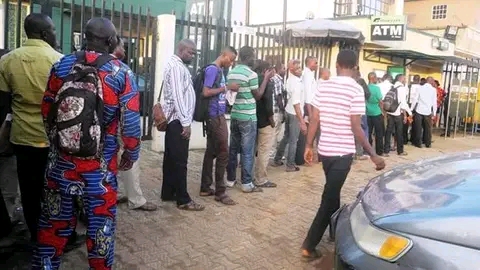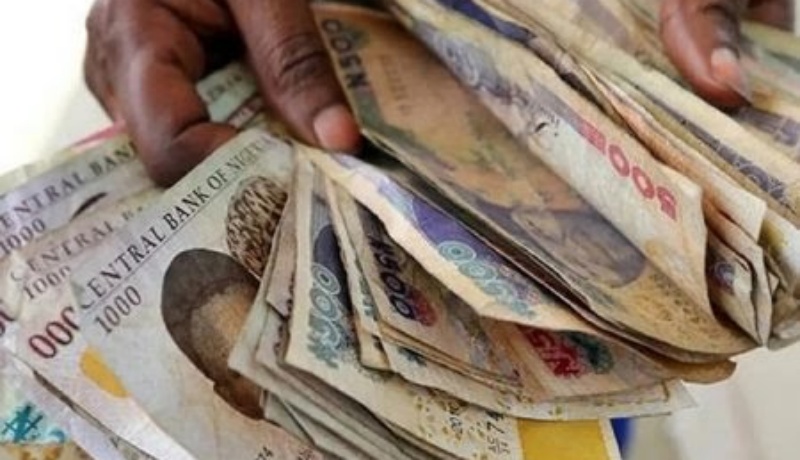- Naira scarcity surfaces in South East zone
- PoS operators hike withdrawal charge as situation persists
- Banks ration cash, blame panic withdrawals, festivities on the situation
South East zone of Nigeria is once again on the edge as naira scarcity has once again crippled the economy in the zone.
According to WITHIN NIGERIA findings, the situation is said to be getting worse by the day.
Investigations revealed that many banks in the zone are said to be cash trapped as at December 5.
However, when our reporter visited First Bank at Enugu road, Nsukka, Enugu state on Saturday, the evidence of cash scarcity was there for every customer to see.
Out of ten Automated Teller Machines, ATMs mounted in the bank, only one was dispensing cash. The rest have been drained of cash and can only be allowed to transact other electronic business like electronic cash transfer, bill payment, purchase of recharge cards and other transactions.
When our reporter asked one of the security men why the bank didn’t stock the ATMs with cash, he simply told him that there was scarcity of cash in the country.

At Ecobank located at University road, Nsukka, out of six ATMs in the bank, none was dispensing cash as at Sunday when our reporter visited the bank.
In fact, customers were not allowed entrance into the bank and one of the security personnel in the bank who spoke to our reporter said that there was no cash on Friday and so, no ATM was loaded.
At Owerri road, Onitsha Anambra state the story is still the same.
United Bank for Africa, UBA located in the area was also under lock and key during weekend.
According to our source, this is because no ATM in the branch was dispensing any cash.
Our source who preferred anonymity equally stated that ” the situation is gradually becoming unbearable. How can bank lock out their customers just like that? I went there on Friday, no ATM was working. They should tell us what is really going on.”
In any case at Enugu road, Abakiliki, Ebonyi state, it is the same story. Majority of the banks in the area was not stocked with banknotes.
Our source recounted that ” I went to Access bank to make some withdrawal. Only two of the seven mounted ATMs were functional.
“The worse is that even the ATMs were programmed in a way that if you want to make withdrawal with another ATM card, you will only be allowed a maximum of N10,000.
“But if you have ATM card of mother bank, you will be allowed a maximum of N20,000. What can N10,000 or N20,000 do for people like me especially in this Christmas season? This is really terrible.”
Nevertheless, one of the staff of Keystone bank in Imo state Johnson Nweze told our reporter said that the situation is unprecedented.
According to him, ” before now, we used to have this kind of situation about a week to the Christmas. But this was different. The cash scarcity started immediately we entered the month of December.”
Asked what could likely be cause of the ugly situation, Mr. Nweze said that ” I think it has to do with what we experienced early this year. People still nurse the fear that the Central Bank of Nigeria, CBN may squeeze cash flow. They are afraid that they may not be able to withdraw their money easily or freely next year, and so, they want to withdraw all their money and keep in their house or wherever they feel is safe other than in the bank.”
Narrating further, he said that ” many of them don’t want to use the money immediately. Rather, they want safe keep it and watch what will happen because they want a repetition of what happened in January whereby they were finding very difficult to make withdrawal.”
When our reporter visited some Point of Sales, PoS, it was also a reflection of the situation in the banks. Many of the POS visited on Wednesday didn’t have any cash.
One of the operators along Orba road Nsukka, Enugu state who gave her name as Chinenye Ezeagu told WITHIN NIGERIA that the situation is becoming harsh for them.
According to her, ” it is very difficult to get cash to operate. Banks now charge to give us cash to operate.
“Some banks only allow you a maximum of N10,000 in a day. Imagine what that meagre amount can do for you.”
Asked how much she charges for withdrawal of N10,000, Miss Ezeagu told our reporter that ” we charge N300 instead of N100 we used to charge. This is to enable to meet up with the charges we incur in the course of getting the fund.”
Another PoS operator who gave his name as Henry Onyebuchi told our reporter that ” for some days now, I don’t have cash. For now, I do only transfer for my customers. I can no longer struggle to get cash to satisfy my customers.”
However, in some banks in Aba Abia state, some banks ration cash for customers who want to make withdrawal inside the bank.
According to our source, “if you want to make a withdrawal inside banks, you are only allowed to make a maximum of N10,00 or N20,000 depending on the cash availability in the bank.”
However, addressing the cash crunch plaguing Nigerians, the Central Bank of Nigeria, CBN, Dr. Yemi Cardoso identified the poorly executed naira redesign as the primary culprit.
He made this known on Wednesday, December 13, during the launch of the World Bank Nigeria Development Update.
Explaining further, he said that “the apprehension surrounding the policy’s end date, well before the third quarter, triggered widespread hoarding,” he admitted. Many feared the old notes would lose legal tender status, prompting them to hold onto their cash.”
However, Cardoso offered a glimmer of hope, citing the Supreme Court’s recent ruling upholding the validity of the old notes beyond the initial deadline. This, he noted, should help alleviate apprehensions and incentivize individuals to release their hoarded cash into circulation.
On the current naira scarcity, Cardoso said: “unfortunately, the history of that lies with the naira redesign policy and coming to the end of the year, way before the third quarter, there was a lot of apprehension with respect to where this was all going to end; and whether the old currency would no longer be good for legal tender and many started hoardings. This is really what happened. Happily, Supreme Court has decided that the currency will be valid post-end of the year.”
